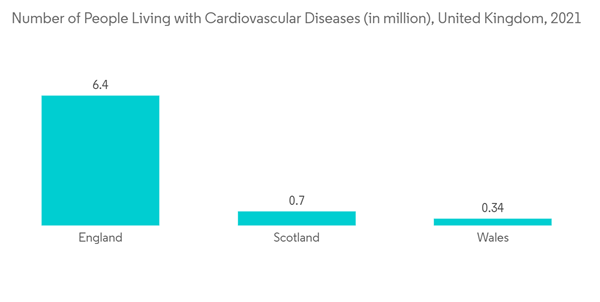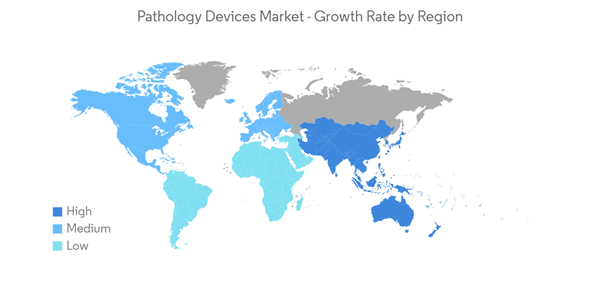Key Highlights
- The COVID-19 pandemic had a huge impact on healthcare systems around the world and caused many healthcare facilities to stop providing routine care and pathological testing, putting patients with chronic conditions, including cancer and cardiovascular disorders, at severe risk. For instance, according to an article published in International Medical Journal in January 2022, it was observed that the ratio of the number of pathology tests pre-lockdown and post-lockdown versus baseline period decreased from 1.02 to 0.53, respectively.
- However, the increased coronavirus cases among the population have increased the demand for pathological tests. For instance, as per an article published in Frontiers in Pathology in March 2022, it was found that the number of molecular microbiology tests was more than three times higher during the lockdown period. This has increased the company's focus on developing innovative pathological test kits and devices. Thus, the studied market is expected to grow and regain its full potential in the coming years.
- The increasing prevalence and burden of Alzheimer's disease, autoimmune diseases, cancer, and others around the world are driving the need for effective and advanced diagnostic tests, hence propelling the market growth. For instance, according to the 2022 statistics published by Alzheimer's Association, an estimated 6.5 million Americans age 65 and older were living with Alzheimer's dementia in 2022, and this number is projected to reach 13 million by 2050. Thus, the expected increase in the number of people suffering from Alzheimer's disease is anticipated to fuel the demand for pathology devices that helps physicians in early identifying the disease-causing dementia symptoms, thereby propelling the market growth.
- Additionally, as per the 2023 statistics published by ACS, about 24,810 malignant tumors of the brain or spinal cord (14,280 in males and 10,530 in females) are expected to be diagnosed in the United States in 2023. Thus, the high burden of brain or spinal cord tumors is anticipated to fuel the demand for radionuclide bone scintigraphy (bone scan) for detecting spinal pathologies, hence bolstering the market growth. Moreover, the rising company focus on developing technologically advanced pathological kits and devices is also contributing to the market growth. For instance, in April 2022, Sysmex Europe launched a new three-part differential system, XQ-320 XQ-Series Automated Hematology Analyzer, a robust device that brings excellence in quality to a diverse range of clinical laboratory environments with reliable technology and a new level of usability.
- Therefore, owing to the factors such as the high burden of chronic and infectious diseases and new product launches, the studied market is expected to grow over the forecast period. However, the high cost of devices and stringent regulations, as well as the lack of skilled professionals, are likely to impede the growth of pathological devices over the forecast period.
Pathology Devices Market Trends
Molecular Diagnostics Segment is Expected to Hold Significant Market Share Over the Forecast Period
- Molecular diagnostic devices are used to analyze biological markers in the genome and proteome to detect pathogens or mutations. Based on the technology, molecular diagnostic devices can be segmented into chips and microarrays, mass spectroscopy, next-generation sequencing (NGS), polymerase chain reaction (PCR)-based methods, cytogenetics, and molecular imaging. Factors such as large outbreaks of bacterial and viral epidemics, increasing demand for point-of-care diagnostics, and rapidly evolving technology are driving the growth of the molecular diagnostics segment.
- The growing burden of cancer, cardiovascular diseases, brain tumors, and others is the key factor driving the segment's growth. For instance, according to the statistics published by the British Heart Foundation, in January 2022, more than 7.6 million people were living with cardiovascular diseases in the United Kingdom in 2021.
- Also, as per 2022 statistics published by the National Brain Tumor Society, approximately 88,970 people were diagnosed with a primary brain tumor in the United States in 2022. Thus, the high prevalence of heart diseases and brain tumors among the population is anticipated to propel the demand for molecular diagnosis, which improves diagnosis accuracy, allows for predictive prognosis, and enables target identification. This is expected to fuel the segment growth over the forecast period.
- Furthermore, the increasing company focus on developing technologically advanced products in molecular diagnostics and rising new product launches contributes to market growth. For instance, in March 2022, Mylab Discovery Solutions launched an entire range of routine diagnostic kits and devices, for immunology, biochemistry, and hematology, in conventional and point-of-care formats. This product line expansion assists the labs in using the company's devices and reagent kits to do all routine tests such as liver panels, cardiac profiles, urine panels, hormone panels, fever panels, kidney function tests, cancer markers, and other tests.
- Therefore, owing to the factors such as the high burden of heart diseases and brain tumors, growing demand for precision medicine as well as rising product launches, the studied segment is expected to grow over the forecast period.
North America is Expected to Have the Significant Market Share Over the Forecast Period
- North America is expected to hold a significant market share in the pathology devices market, owing to the rising prevalence of infectious and chronic diseases, better healthcare infrastructure, and the technological advancements of pathological devices.
- The increasing number of chronic and infectious diseases in the region increases the demand for early detection and diagnosis of the condition, which in turn is anticipated to fuel the demand for pathological testing, thereby boosting the market growth. For instance, according to 2023 statistics published by ACS, about 1,958,310 new cancer cases are projected to be diagnosed in the United States in 2023.
- In addition, from the same source, 1,63,020 new cases of colorectal cancer, followed by 2,38,340 cases of lung and bronchus, 297,790 breast cancer, and 288,300 prostate cancer, are expected to be diagnosed in the United States in 2023. Also, as per 2022 data published by CDC, about 12.1 million people in the United States are expected to have atrial fibrillation in 2030. Thus, the rising burden of breast cancer and heart disease cases among the population is anticipated to increase the demand for diagnostic tests for the early detection of cancer, thereby propelling market growth.
- Furthermore, the increasing number of new product launches in the region increases the availability of products and test kits, which is also expected to boost market growth over the forecast period. For instance, in June 2021, Thermo Fisher Scientific Inc. launched TaqPath, a new CE-IVD-marked fast PCR combo kit 2.0, to detect active SARS-CoV-2 infection.
- Also, in March 2021, MatMaCorp launched a new handheld device, MY Real-Time Analyzer (MYRTA), which can carry out polymerase chain reaction (PCR) amplification and real-time fluorescent detection. Therefore, due to the aforementioned factors, such as the high burden of cancer and heart disease among the population, increasing company activities, and the growing number of pathological labs in the region, the studied market is expected to grow over the forecast period.
Pathology Devices Industry Overview
The pathology devices market is fragmented as numerous global and local companies are present in the market. The companies are focusing on adopting various business strategies, such as product launches, agreements, and collaborations, to withhold their market position. Some of the key players in the market are Abbott Laboratories, Becton, Dickinson and Company, Ortho-Clinical Diagnostics, F. Hoffmann-La Roche AG, Danaher Corporation, and Bio-Rad Laboratories, among others.Additional Benefits:
- The market estimate (ME) sheet in Excel format
- 3 months of analyst support
This product will be delivered within 2 business days.
Table of Contents
Companies Mentioned (Partial List)
A selection of companies mentioned in this report includes, but is not limited to:
- Abbott Laboratories
- Becton, Dickinson and Company
- Bio-Rad Laboratories
- Beckman Coulter Inc.
- Definiens
- Hamamatsu Photonics
- Mikroscan Technologies
- Ortho-Clinical Diagnostics
- F. Hoffmann-La Roche AG
- Thermo Fisher Scientific
- Danaher Corporation
- Siemens Healthineers










